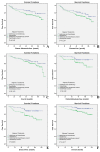Early versus late distant metastasis and adjuvant chemotherapy alone versus both radiotherapy and chemotherapy in molecular apocrine breast cancer
- PMID: 27340922
- PMCID: PMC5226479
- DOI: 10.18632/oncotarget.10211
Early versus late distant metastasis and adjuvant chemotherapy alone versus both radiotherapy and chemotherapy in molecular apocrine breast cancer
Abstract
As a new subtype of breast cancer, molecular apocrine breast cancer (MABC) is estrogen receptor (ER) and progesterone receptor (PR) negative expression, but androgen receptor (AR) positive expression. The prognostic significance and clinical biological behavior of MABC have remained unclear up to now. This study aimed to analysis the distant metastasis behavior and response to adjuvant radiotherapy and chemotherapy of MABC subgroup. The report showed that there were significant differences between early and late distant metastasizing tumors with respect to Ki67, epidermal growth factor receptor 2 (HER2) and vascular endothelial growth factor (VEGF) expressions by a retrospective analysis consisting of 410 invasive breast cancer patients, which included 205 MABC and 205 nonMABC cases. MABC subgroup metastasized earlier than nonMABC subgroup, and MABC showed a tendency for a higher metastasis rate in lung, liver and brain, but lower in bone. HER2-positive or VEGF-positive tumors were more inclined to develop bone metastasis within MABC subgroup. The survival rate was superior for patients undergone both adjuvant radiotherapy and chemotherapy than those undergone chemotherapy alone in nonMABC subgroup, but there was no significant difference in MABC subgroup. Our data suggested that MABC subgroup seemed to develop distant metastasis earlier than nonMABC subgroup, and patients with MABC indicated poor prognosis. This study might also provide a foundation for helping patients receive reasonable treatments according to molecular subtype.
Keywords: Pathology Section; androgen receptor; distant metastasis; molecular apocrine breast cancer; radiotherapy and chemotherapy; survival rate.
Conflict of interest statement
The authors declare no conflicts of interest.
Figures




Similar articles
-
Heat shock protein 27 and gross cystic disease fluid protein 15 play critical roles in molecular apocrine breast cancer.Tumour Biol. 2016 Jun;37(6):8027-36. doi: 10.1007/s13277-015-4712-4. Epub 2015 Dec 28. Tumour Biol. 2016. PMID: 26711786 Clinical Trial.
-
Apocrine carcinoma as triple-negative breast cancer: novel definition of apocrine-type carcinoma as estrogen/progesterone receptor-negative and androgen receptor-positive invasive ductal carcinoma.Jpn J Clin Oncol. 2012 May;42(5):375-86. doi: 10.1093/jjco/hys034. Epub 2012 Mar 26. Jpn J Clin Oncol. 2012. PMID: 22450930
-
The importance of EGFR as a biomarker in molecular apocrine breast cancer.Hum Pathol. 2018 Jul;77:1-10. doi: 10.1016/j.humpath.2018.01.016. Epub 2018 Jan 31. Hum Pathol. 2018. PMID: 29409930
-
Proteomics as a Guide for Personalized Adjuvant Chemotherapy in Patients with Early Breast Cancer.Cancer Genomics Proteomics. 2015 Nov-Dec;12(6):385-90. Cancer Genomics Proteomics. 2015. PMID: 26543084 Review.
-
Apocrine carcinoma of the breast: A brief update on the molecular features and targetable biomarkers.Bosn J Basic Med Sci. 2017 Feb 21;17(1):9-11. doi: 10.17305/bjbms.2016.1811. Bosn J Basic Med Sci. 2017. PMID: 28027454 Free PMC article. Review.
Cited by
-
Late Endobronchial Pulmonary Metastasis in a Patient with Breast Cancer.Turk Thorac J. 2018 Apr;19(2):97-99. doi: 10.5152/TurkThoracJ.2017.17021. Epub 2017 Nov 29. Turk Thorac J. 2018. PMID: 29755815 Free PMC article.
-
Androgen receptor and heat shock protein 27 co-regulate the malignant potential of molecular apocrine breast cancer.J Exp Clin Cancer Res. 2018 Apr 27;37(1):90. doi: 10.1186/s13046-018-0762-y. J Exp Clin Cancer Res. 2018. PMID: 29699584 Free PMC article.
References
-
- Buchanan G, Birrell SN, Peters AA, Bianco-Miotto T, Ramsay K, Cops EJ, Yang M, Harris JM, Simila HA, Moore NL, Bentel JM, Ricciardelli C, Horsfall DJ, et al. Decreased androgen receptor levels and receptor function in breast cancer contribute to the failure of response to medroxyprogesterone acetate. Cancer Res. 2005;65:8487–8496. - PubMed
-
- Riva C, Dainese E, Caprara G, Rocca PC, Massarelli G, Tot T, Capella C, Eusebi V. Immunohistochemical study of androgen receptors in breast carcinoma. Evidence of their frequent expression in lobular carcinoma. Virchows Arch. 2005;447:695–700. - PubMed
-
- Park S, Koo JS, Kim MS, Park HS, Lee JS, Lee JS, Kim SI, Park BW, Lee KS. Androgen receptor expression is significantly associated with better outcomes in estrogen receptor-positive breast cancers. Ann Oncol. 2011;22:1755–1762. - PubMed
-
- Tsang JY, Ni YB, Chan SK, Shao MM, Law BK, Tan PH, Tse GM. Androgen receptor expression shows distinctive significance in ER positive and negative breast cancers. Ann Surg Oncol. 2014;21:2218–2228. - PubMed
MeSH terms
Substances
LinkOut - more resources
Full Text Sources
Other Literature Sources
Medical
Research Materials
Miscellaneous

